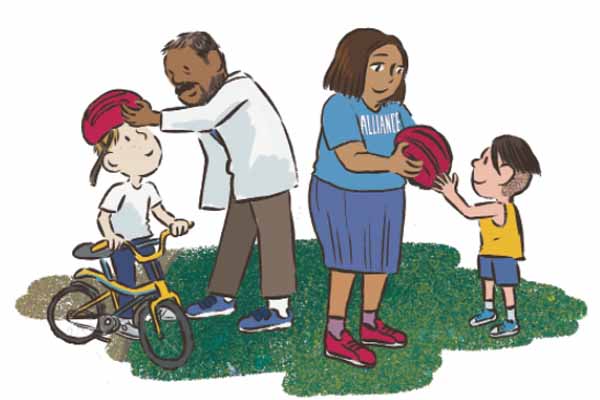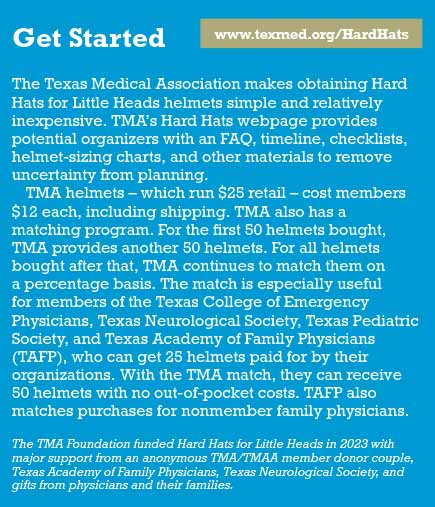
In 1993, a near tragedy showed San Angelo pain specialist Larry Driver, MD, a really great way to help people.
“A neighbor child was riding her bicycle and hit her head on the curb and suffered a concussion,” he told Texas Medicine. “She had no helmet on. She fully recovered and is an adult woman with her own family now. But the idea occurred to me that there’s an opportunity there.”
Dr. Driver created a program that allowed physicians to supply bike helmets to kids. To test it, he set up a pilot project in San Angelo that successfully gave away 50 helmets. The following year, he introduced a resolution to the Texas Medical Association’s House of Delegates that created Hard Hats for Little Heads, a program available statewide through TMA that encourages helmet use for all wheeled activities, including biking, skating, skateboarding, and riding a scooter.
Since then, TMA’s longest-running outreach program also has become its most frequently used program, giving away more than 375,000 helmets and winning participation from county medical societies, TMA Alliance and medical student chapters, and medical practices across the state.
Hard Hats events frequently generate media attention and give positive visibility to physicians, says former TMA President and TMA Foundation President Mark Kubala, MD. That can help break down barriers between physicians and their community.
“Individually, the patients have a great deal of love and respect for their doctor,” he said. “But sometimes physicians as a group are not well thought of, and it’s when we do public health [outreach] that the benevolence of physicians comes forward.”
As of 2021, Hard Hats giveaways have taken place in 159 of Texas’ 254 counties, and the program’s popularity springs in part from the fact that it squarely hits its audience – kids, says pediatrician Scott Coleman, MD. His clinic, El Paso Pediatric Associates, regularly holds health care fairs in the fall and spring that cover serious health topics, like updating vaccinations, but do so in a fun way that supplies plenty of food, games, and activities. One of the activities kids like most is getting a free Hard Hats helmet.
“You see them leaving, and they’ve had the helmet on the entire time,” he said.
The Hard Hats motto – “Get Moving. Stay Safe. Wear a Helmet.” – points out that making activities like biking and skating safer is fun and naturally encourages outdoor activity. For instance, the events at Dr. Coleman’s clinic take place in a closed-off parking lot where newly helmeted kids can ride around and get plenty of exercise.
The red, white, and black helmets given out at Hard Hats events have been popular with kids, especially when they find out they’re free, says Nacogdoches pediatrician Modupe Sokunbi, MD, president of the of Nacogdoches-San Augustine County Medical Society (NSACMS).
“[They] wanted to call their friends and cousins to say that [someone is] giving out helmets,” she said. “You just have to promise to wear them.”
The Texas Neurological Society (TNS) donated to Hard Hats this year in part to help pay for the group’s own plans to hold a Hard Hats event in the summer, says Houston neurologist Eddie Lee Patton Jr., MD. The immediate past president of TNS is a member of TMA's Council on Heath Promotion, which oversees outreach programs like Hard Hats.
Like most neurologists, he sees plenty of traumatic head injuries caused by riding accidents. The fact that kids love getting the helmets makes it a natural draw for parents, and that’s a rich educational opportunity for physicians, Dr. Patton says.
“A lot of times, particularly if you’re able to do these programs in underserved communities, parents appreciate it,” he said. “And it gives you the opportunity to do more education about things like preventing concussion, preventing head injuries, and how to put on the helmet and fit it properly.”

TMA Alliance chapters and medical student groups frequently put on Hard Hats events and regularly provide volunteers. But Hard Hats event organizers also look to outside allies to help generate publicity, defray costs, and share resources, Dr. Coleman says.
Fortunately, it’s easy to collaborate with other groups on Hard Hats events. His clinic worked with its local Medicaid managed care organization, which helped sponsor the event and created similar relationships with other medical practices. The clinic also got the fire department to bring a fire truck for children to tour.
That advance planning is important to avoid surprises, Dr. Coleman says. For instance, his practice had not counted on how bulky 50 bicycle helmets can be and had to hunt for an adequate storage spot.
Also, finding a proper venue for your event can take time but is worth getting right, Dr. Sokunbi says. When NSA-CMS started its Hard Hats events in 2018, it chose the Nacogdoches Blueberry Festival, which draws about 19,000 people every June, Dr. Sokunbi says. That proved to be a good choice, allowing the county medical society to give away 185 helmets in its first year alone. It also holds an annual event at the Poultry Festival in neighboring Shelby County.
Those venues work very well. But as with so many things, the COVID-19 pandemic interrupted the giveaways for two years, prompting NSACMS to look for other long-term venues as well. That might include working with pediatricians to give out helmets at well visits or working with police and fire departments, among other ideas, Dr. Sokunbi says.
“We’re just looking for other ways of spreading the message,” she said.
Many Hard Hats programs focused on speaking with kids in schools, but that has increasingly posed problems, Dr. Kubala says. Schools are now less accessible to outsiders because of security concerns and because busy school curricula often leave little room for speakers.
Other venues – such as health fairs and community events – have advantages over schools. Namely, they give Hard Hats volunteers a chance to speak to both the parent and the child.
“If we get the parents on board then we know the child will wear the helmet,” he said. “Whereas, at the schools we don’t know if they just go home and put it in the closet.”
TMA stresses that each Hard Hats event should fit the bike helmet to each child’s head, not simply hand out helmets, Dr. Coleman says. It’s important for both kids and parents to understand that only a properly fitted bike helmet provides adequate protection.
Given that, event volunteers might want to practice measuring a head and fitting a helmet beforehand, he says.
“Anybody can do it, but a person who’s done it before is going to get the knack of it a little bit easier,” Dr. Coleman said.
As a rule, the younger children are, the more likely they are to accept the idea of wearing a helmet, Dr. Sokunbi says.
“The younger kids loved it” at past events, she said. “It was just such a joy to see them in their bright, shiny helmets.”
Older kids, in contrast, are more likely to see wearing a helmet as an image problem with their friends, Dr. Sokunbi says.
“They’re the ones we had to sit down and say, ‘Look, we know you’re grown, you’re teenagers, but this is important,’” she said.
It’s safe to assume, though, that the physicians and TMA Alliance members who have collectively participated in Hard Hats have helped thousands of kids stay healthy, Dr. Driver says. That’s why it’s vital to keep the program moving forward.
“We can be gratified in knowing that we have really made a major impact in helping those kids avoid a potentially dramatic injury with long-term, far-reaching consequences,” he said.